Missing teeth- Causes, Consequences, Replacement
Our teeth are vital to our everyday life as without them our lifestyle choices would need several adjustments and compromises. The most common dental disease like tooth decay that is beyond repair or gum (periodontal) diseases could ultimately lead to loss of teeth.
Missing one or many teeth causes several consequences like :
- Difficulty in chewing
- Inability to consume certain foods containing essential nutrients
- Self consciousness or embarrassment while smiling or talking
- Altered speech
- Weakening of remaining teeth due to increased stress or wear
- Movement or shifting of the remaining teeth to compensate for gaps
- Bone loss- As our teeth are embedded into the jaw bones, they need constant use (chewing/ biting) to remain healthy. Ones the teeth are lost the jaw bone undergo resorption and deterioration over time, resulting in facial changes but more importantly – increased costs and complications in replacing with artificial teeth.
In order to ensure you do not encounter any of the above nasty consequences, it is important that we replace those missing teeth with artificial teeth also called as dental prosthesis or ‘dentures’. A dental prosthesis replaces not only the missing teeth but also the associated structures (missing bone and gum tissue) in order to facilitate improved chewing ability, appearance and speech.


Complete Dentures
Complete denture is the prosthesis of choice when all the teeth have been removed. By replacing the missing teeth and associated structures it not only facilitates better chewing but also improves appearance and speech.
In a scenario where all the teeth are missing in the oral cavity, the complete denture is held in position by physical factors like intimate contact with the oral tissues, suction, muscle co ordination, etc. It is a removable type of prosthesis.
CONVENTIONAL DENTURE
It is the definitive prosthesis made ready about six to twelve weeks after the teeth have been removed. That is the minimum time for the healing of the gums.
IMMEDIATE DENTURES
These are temporary dentures made in advance and positioned immediately after teeth removal. As a result, the wearer does not have to be without teeth during the healing period. However, bones and gums tend to shrink over time, especially during the healing period following tooth removal. Therefore, immediate dentures tend not to fit after the complete healing of the gums and need to be replaced with a new set of dentures.
OVERDENTURES
These are removable complete dentures which are fitted over 2-4 remaining natural teeth roots or dental implants. They have added advantage of better grip, improved chewing and comfort.
Fixed and Partial Denture
FIXED DENTURES:
Artificial teeth can be permanently fixed in order to replace the missing teeth either by taking support of the adjacent natural teeth called as bridges or can be fixed on to a dental implant (artificial tooth root). Fixed denture cannot be removed by the patient; they can only be removed by a dentist.
CROWN AND BRIDGES
These are fixed type of dental prosthesis which replaces one or more missing teeth. They bridge the gap caused by missing teeth by replacing with artificial teeth and take support of the adjacent natural teeth. The supporting natural teeth on either side of the missing teeth need to be shaped / modified in order to receive the crown. The artificial replacement tooth is attached to the crowns that cover the supporting teeth and cemented in position.
CROWN
Single cap, cap be made or porcelain fixed to metal all aromatic or zircon to make the colour of natural teeth in Large restorations , Protect badly damaged teeth Strengthen after root canal treatment. Few of the crowns will come with a warranty of 15 years.
BRIDGE
Missing teeth are replaced by taking support of the neighbour teeth where cost is the consideration where implants is not advised.
TYPES
- All Metal
- porcilain fixed metal
- metal free / all ceramic
- zirconia crowns.
Few of the bridges will come with a warranty of 15 years.


Dental Implants
To replace a missing tooth, we will surgically implant a metal post into the jawbone, which will fuse with the gum tissue and bone over time. This creates a strong foundation on which to place a realistic-looking artificial tooth (or crown). Dental implants are great for those with tooth loss who are looking for a long-term treatment option.
Advantages of Dental Implants
When looking at the advantages of dental implants, it is helpful to compare them against other the above options to replace missing teeth.
Compared with Partial Dentures
Many patients prefer implants over partial dentures as implants are fixed in place and are not removed nightly. Implants can also be more aesthetic, as they do not have hooks or clasps that can be visible when smiling.
Compared with Conventional Bridges
In situations where the the natural teeth (abutments) are completely healthy, shaving or reducing them to prepare for a bridge “damages” them unnecessarily. Furthermore, should any of the natural teeth/abutments be lost for any reason (eg: decay or gum disease), the entire bridge is usually lost as well. In contrast, implants do not affect the adjacent abutments, they are placed only in the positions where teeth are missing, and do not rely upon the adjacent teeth.In addition, bridges can generally only be placed where there are natural teeth/abutments on either side of a space (except for limited-use “cantilever bridges”). In contrast, an implant can still be placed even in situations where an abutment is missing.

